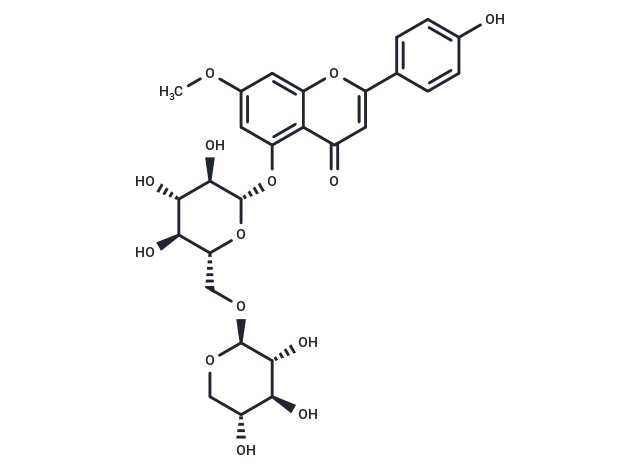Shopping Cart
- Remove All
 Your shopping cart is currently empty
Your shopping cart is currently empty

Yuankanin, a natural compound found in thyme leaves, Daphne gnidium and Daphne feddei, is a genkwanin-5-bioside with anthelmintic activity.

| Pack Size | Price | Availability | Quantity |
|---|---|---|---|
| 1 mg | $97 | In Stock | |
| 2 mg | $142 | In Stock | |
| 5 mg | $239 | In Stock | |
| 10 mg | $378 | In Stock | |
| 25 mg | $626 | In Stock |
| Description | Yuankanin, a natural compound found in thyme leaves, Daphne gnidium and Daphne feddei, is a genkwanin-5-bioside with anthelmintic activity. |
| In vitro | We report herein bioassay-guided isolation of three anthelmintic flavones 1-3, including the flavone, 5,6,2',5',6'-pentamethoxy-3',4'-methylenedioxyflavone (3) from the methanol extract of Struthiola argentea (Thymelaeaceae). The structure of 3 was elucidated by analysis of its 1D and 2D NMR and MS data. The two major flavones produced by this plant were also isolated and identified as Yuankanin (4) and amentoflavone (5). A number of flavones related to the compounds isolated from S. argentea were acquired and tested to ascertain structure activity relationships. The isolation, structure, anthelmintic activity and structure activity relationships of the flavones are described. |
| Molecular Weight | 578.52 |
| Formula | C27H30O14 |
| Cas No. | 77099-20-8 |
| Smiles | O(C1=C2C(OC(=CC2=O)C3=CC=C(O)C=C3)=CC(OC)=C1)[C@@H]4O[C@H](CO[C@H]5[C@H](O)[C@@H](O)[C@H](O)CO5)[C@@H](O)[C@H](O)[C@H]4O |
| Relative Density. | 1.66 g/cm3 (Predicted) |
| Storage | store at low temperature,keep away from direct sunlight | Powder: -20°C for 3 years | In solvent: -80°C for 1 year | Shipping with blue ice. |

Copyright © 2015-2025 TargetMol Chemicals Inc. All Rights Reserved.